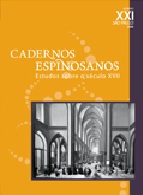The secularization of the religious affects in Spinoza’s works: hope and fear, love and generosity
DOI:
https://doi.org/10.11606/issn.2447-9012.espinosa.2009.89366Keywords:
Emotion, Morality, Secularism, Love, GenerosityAbstract
Positioning himself as «natural philosopher» in the treatment of the passions, Descartes initiates a secularization of affects or emotions. Surely with regard to this he is followed by Spinoza. In both cases, the philosophical approach of affection is to release them from a moral perspective, secularizing in this manner the emotions: separated from morality, their explanations are no more attached to religion, since the moral is based on the idea of transcendent God. At this point, Spinoza goes further than Descartes at the secularization of emotions, because in Spinoza God is naturalized, God sive natura. Generosity, for example, does not depend on a God endowed with good will, but on the natural exercise of human reasoning as part of the rationalized Nature. So that even the intellectual love of God would not be a substitute for religious moral impulse: to Spinoza, this love, as well as generosity and friendship, is in necessary order of nature, neither depending on a divine free will, nor being reducible to human will exclusively.Downloads
Download data is not yet available.
Downloads
Published
2009-12-15
Issue
Section
Artigos
License
Autores que publicam nesta revista concordam com os seguintes termos:
- Autores mantém os direitos autorais e concedem à revista o direito de primeira publicação, com o trabalho simultaneamente licenciado sob a Licença Creative Commons Attribution que permite o compartilhamento do trabalho com reconhecimento da autoria e publicação inicial nesta revista.
- Autores têm autorização para assumir contratos adicionais separadamente, para distribuição não-exclusiva da versão do trabalho publicada nesta revista (ex.: publicar em repositório institucional ou como capítulo de livro), com reconhecimento de autoria e publicação inicial nesta revista.
Authors who publish in this journal agree to the following terms:
a. Authors retain copyright and grant the journal the right of first publication with the work simultaneously licensed under the Creative Commons Attribution License that allows to share the work with an acknowledgment of its authorship and initial publication in this journal.
b. Authors are authorized to take on additional contracts separately, to non-exclusive distribution of the article published in this journal (ex.: to publish in institutional repository or as part of a book), with an acknowledgment of its initial publication in this journal.
How to Cite
Boros, G. (2009). The secularization of the religious affects in Spinoza’s works: hope and fear, love and generosity. Cadernos Espinosanos, 21, 11-40. https://doi.org/10.11606/issn.2447-9012.espinosa.2009.89366


